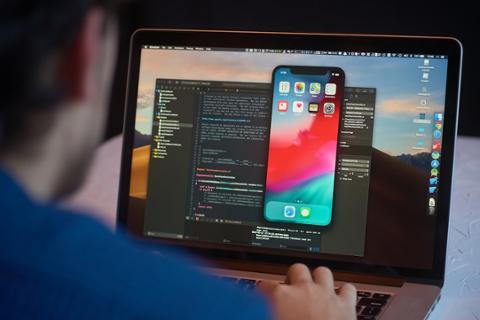Front end developers have a crucial job: they must ensure that all user-facing parts of a website work perfectly. It’s also a job that’s steadily evolving, which makes preparing for a front end developer job interview that much harder.
Front end developers are involved in everything that impacts the navigation, layout, and design elements of desktop and mobile sites and apps. That means they must be skilled in HTML, CSS, and JavaScript; in addition, they must have great “soft skills” such as communication and teamwork, as they’re often working in multi-disciplinary teams with back-end developers, designers, and others.
According to Lightcast (formerly Emsi Burning Glass), which collects and analyzes millions of job postings from across the country, the following skills pop up frequently in conjunction with front end developer job openings:
- JavaScript
- Front-End Development
- Software Engineering
- React JavaScript
- TypeScript
- Software Development
- Web Application Development
In addition, many job postings list the following “soft skills”:
- Teamwork/collaboration
- Communication skills
- Writing
- Problem solving
- Creativity
- Troubleshooting
- Planning
During a front end developer job interview, a recruiter or hiring manager will query you about your skills, and may even give you a technical exam designed to evaluate your development abilities. Before heading into any interview, take some time to ensure your skills are polished; sites such as LeetCode are excellent ways to test your programming abilities, for instance.
What kinds of questions are asked during front end developer job interviews?
It’s impossible to know the exact questions you’ll face during a job interview; different companies have different needs, and no two hiring managers are alike when it comes to evaluating a candidate’s skills and cultural fit.
However, it’s pretty typical for any company to ask about your technical skills, especially for more junior-level positions. Simplilearn has a solid breakdown of some technical questions that pop up in interviews, including, but not limited to:
- How are JavaScript and jQuery different?
- What is cross-site scripting?
- What’s your approach to content security policy (CSP)?
- What is scope in JavaScript?
- How have you decreased page load time?
- Differentiate between a centralized and a distributed version control system.
Other sites offer similar lists, including Turing.edu and GitHub; the latter offers questions broken down by subcategory, including performance, testing, accessibility, networking, coding, and more. For instance, how would you answer the following questions from that GitHub repo:
- Traditionally, why has it been better to serve site assets from multiple domains?
- Do your best to describe the process from the time you type in a website's URL to it finishing loading on your screen.
- What are the differences between Long-Polling, Websockets and Server-Sent Events?
No matter what the company or job opportunity, you might be asked to give a top-level explanation of a particular language feature, tool, or process; alternatively, the interviewer could ask about your previous experiences with those. For instance, they might want to know how you resolve merge conflicts in GitHub, especially if you’re expected to work with a large team on building or maintaining a website.
And don’t neglect researching your target company beforehand; many interviewers will ask questions designed to surface why you want to work for that specific company. For instance:
- What do you understand about our organization and the direction we are moving in?
- Why are you passionate about this position?
- How will your front end developer skills help us fulfill our overall strategy?
Many companies are looking for front end developers with lots of experience in mobile; you must know how to develop applications for iOS and Android, and many front end developer interview questions will dig into your mobile skill-set. And it’s not just a question of building UX and applications that look good to the user; front end developers will need to know how to address the inevitable privacy, data, and security questions that arise when dealing with customer- and business-facing products.
You should also come with personal stories of how you used your “soft skills” such as empathy and communication to help your previous teams and organizations move past significant website challenges. Organizations want team players; show them you have what it takes to help everyone around you succeed.
What else do I need to know to prepare?
Dice Insights spoke with Victor Janulaitis, CEO at Janco Associates, a consulting firm that deals with IT and business infrastructure, to break down the challenges faced by today’s front end developers, the most important skills that could pop up during job interviews, and how to “wow” during the application process.
“They have to be current with the trends of what’s happening with end-user computing,” Janulaitis said. “They have to understand how to structure themselves so they can work in a team, where you’re dealing with subsets of code.”
When talking about the architecture of the containers or how they design applications, front end developers need to think of their work as a piece of structured infrastructure that must have a consistent look and feel across the organization.
“The front end developer has to be able to explain how to do that,” Janulaitis continued. “You have to make sure you have good validation processes. How do they interact with other front end devs in the development and testing process, how do they go through and do a regression test to make sure what they did is functioning?”
In addition to walking interviewers through their process, front end developers should prepare to talk about their past experience, especially those elements relevant to the job at hand. For example, if you’re applying for a job that involves a lot of mobile-based work, have some stories ready about how you recognized and overcame challenges related to front end development for iOS and Android.
What qualities make me a good front end developer candidate?
“Somebody who has a very good work ethic and understands what priorities are,” Janulaitis said. “Let’s take the current situation—you’re a front end developer and there’s a crisis and you have to work away from everyone else, and you have to complete a quality job—are you self-actuating to make sure things get done?”
Especially in a work-from-home environment, it all comes down to the ability to successfully prioritize tasks, as well as knowing what’s most important to accomplish first for the good of the project as a whole. “If they have that mindset, they can be very successful as front end developers,” Janulaitis added.
Beyond personal drive and proficiency with technical skills, being able to work collaboratively and quickly with co-workers is another essential ability. “When you’re dealing with a complex project with lots of code and lots of team tools, like Microsoft Azure, where people can put bugs in, and you can work on projects together, you need to have that kind of experience,” he said. “Issues appear in real time and have to be solved in real time. They have to understand version control and revision control, what that is, and have they the organization skills to deal with that. The lone ranger no longer exists in that environment—you have to be able to support the team.”
What should I ask?
During any job interview, the interviewer will ask if you have any questions. This is a great opportunity to ask anything about the workflow or company priorities that you find confusing—and while it may be a tough thing to ask pointed questions about the stability of the organization and team you might be joining, it’s better off to ask the tough questions now then be unhappily surprised later.
“Inquire about how long the team has been in place, how many original team members are still there,” Janulaitis said. “If it’s a startup, ask if they can fund the next six months of payroll. I’ve seen startups in Utah simply run out of funding, and they have to let everyone go. A front end developer needs to make sure they can do the job, but also make sure the company will still be around for you to do the job.”
It also means you should do your research before plunging into the interview. Make sure to read through a few years’ worth of news stories (and press releases) about the company. If you have mutual friends with someone who’s worked at the firm, it’s also okay to ask for an introduction; many folks are willing to engage in a quick informational interview about their experiences.
“Find out how the company operates—you have to do your due diligence in the whole process, and make sure the company is not trying to oversell your capabilities, either,” Janulaitis concluded.


